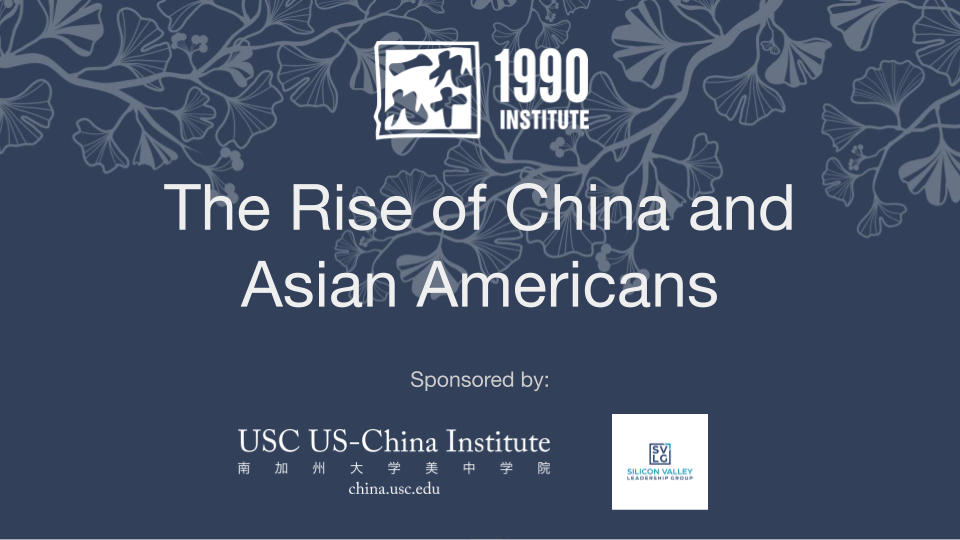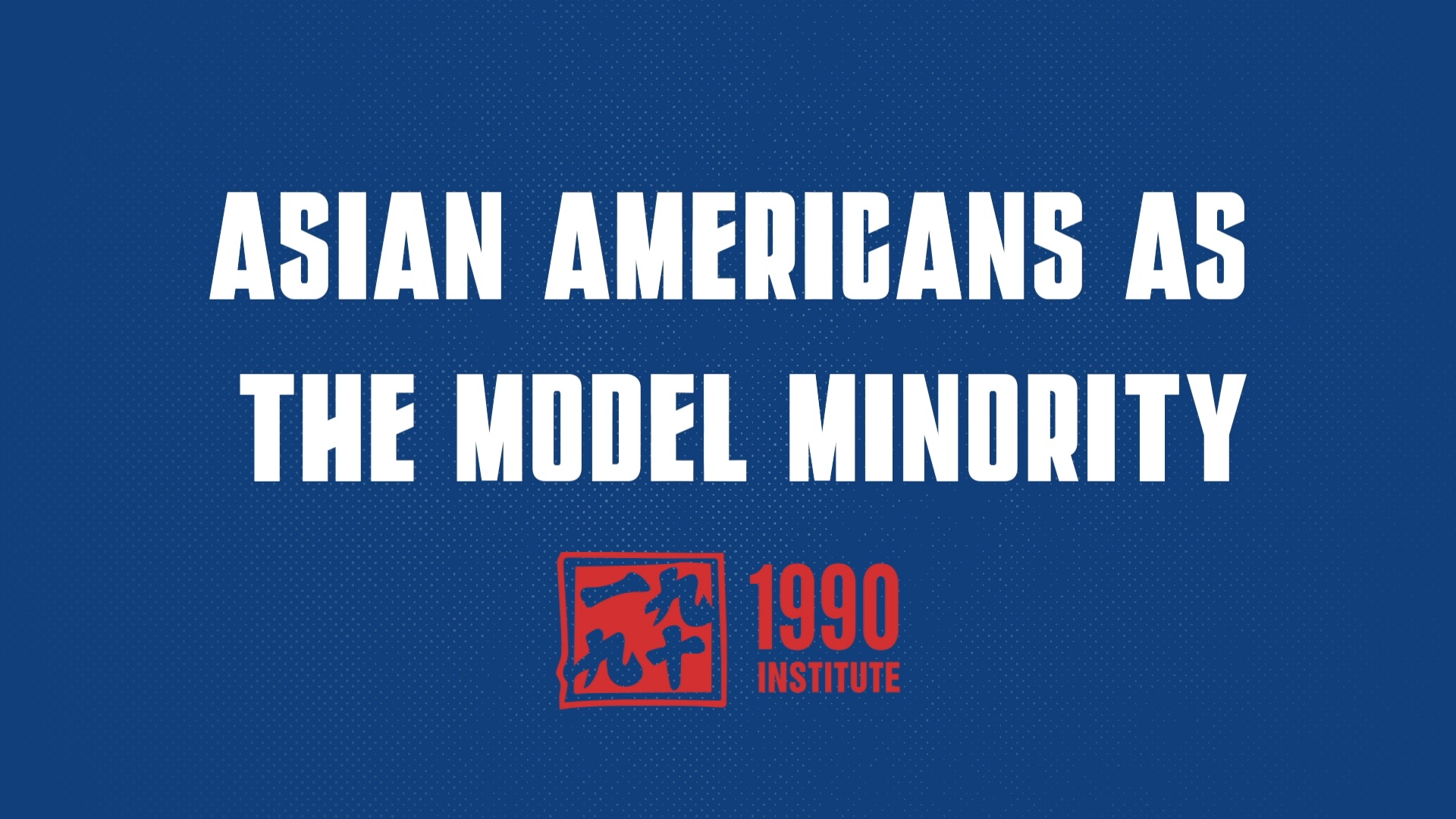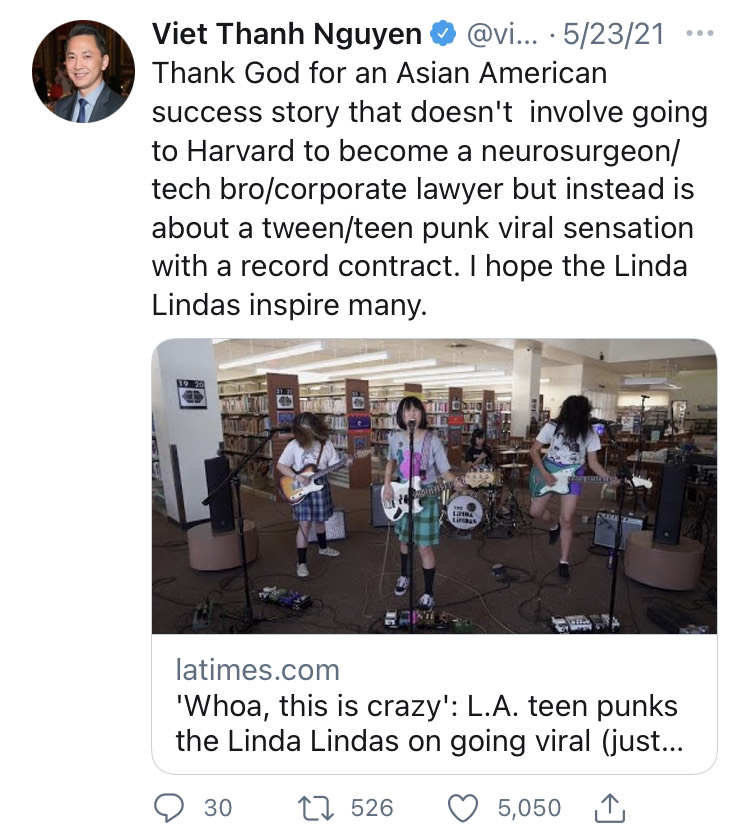| | | Dear Friends, Here is the latest news, analysis, and reflections in our ninth 1990 Institute Newsletter. You can find all our previous newsletters here. Please share and encourage your friends to subscribe so they can get this great content straight to their inboxes, and thanks for your continued financial support. To celebrate the end of the school year (why should the kids have all the fun?), here is a 1990 Institute Pop Quiz: Which two countries are the top manufacturers of disposable face masks? (Read to the end to find out.) |
| |  | |
|
| Breaking Labels: When Perceptions of China Impact Perceptions of Asian Americans By Frances Kai-Hwa Wang Now that the weather is finally warmer, I am out in my #pandemicgarden again. Neighbors I have not seen since autumn stop to make small talk as they walk their dogs. Across the street, the Little Brother Brigade marches back and forth in this neighborhood full of Big Sister Bosses. No longer babes in strollers or trailing sidekicks, this trio of little brothers — maybe 3, 5, 7 years old — could possibly be categorized many different ways — immigrant, child of immigrants, grandchild of immigrants, Asian American, Chinese American, Arab American, Muslim American, white, multiethnic, bilingual, adoptee, adorable. Today, however, the only category that matters is Little Brother because they are breaking free of that label as they march up and down the block on their own, singing. That is the thing about identity labels. Sometimes they mean everything, and other times they do not matter at all. Context is key. In this time of COVID-19-inspired-anti-Asian American violence, the 1990 Institute has been examining the impact that perceptions of China’s economic advancements has on Asian Americans. “Nearly one in six STEM workers in Silicon Valley was born in China and many more are of Chinese descent,” Peter Leroe-Muñoz, Silicon Valley Leadership Group General Counsel and Senior Vice President of Technology and Innovation, said at a recent 1990 Institute webinar on The Rise of China and Asian Americans. “In Silicon Valley, we rely on nearly 60 percent of our STEM workforce that are immigrants. And when you think about that, that is the single largest concentration of foreign workers in an innovation region throughout the country, whether it’s competing against New York or Austin or Seattle or anywhere else. So the innovation economy owes a tremendous debt to immigrants and to Asian Americans as a whole….Just from a strictly bottom line perspective, the rhetoric in and of itself that is xenophobic [or] nationalistic ultimately only undermines the work that we're doing.” “From the vantage point of those who’ve been targets of the virus, I think there’s been tremendous damage already. And I think there’s tremendous fear,” Stanford professor of history and 1990 Institute Advisory Board member Gordon H. Chang said at the webinar. “So many of the attacks have been directed extensively against Chinese ancestry people. But the actual victims have been Filipino, Japanese, Latinx. They’ve been dark-skinned people of some sort. It doesn’t matter. It’s been a racialized assault. And I think that we know race is a very big problem in our country and that bogeyman has been unpacked now and is not going to go away soon.” “This issue of research security and our open science model comes with some inherent vulnerabilities, but it also comes with collaboration, which has made it so great.” Seton Hall Law Professor Margaret Lewis told 1990 Institute. “So I do think it is a totally fair and necessary question to ask what kind of research security do we need? But that should be done in a country-neutral manner. And it should be [done] looking at what kind of intellectual property we want to protect, not focused on a China framing….I've never seen a strategy that says compete better by knowing less about whom you're competing with.” |
|
|
| | OPINION: Viet Thanh Nguyen: The Beautiful, Flawed Fiction of ‘Asian American’ | New York Times “One is not born an Asian American. It’s an identity that is inherently political, and must be chosen. Before college, I had never even heard of the term, but I vividly remember the moment that I became Asian American.” This 104-year-old Oakland seed company makes traditional cooking possible for Asian Americans | The Berkeleyside Kitazawa Seed Company is the oldest seed company in America specializing in Asian vegetable seeds. Family owned since 1917, it specializes in harder-to-find seeds for growing vegetables common to Japanese, Thai, Indian, Chinese and Korean cuisines. Here's What The New Hate Crimes Law Aims To Do As Attacks On Asian Americans Rise | NPR President Biden signed legislation that addresses hate crimes throughout the COVID-19 pandemic, "My message to all of those who are hurting is: We see you and the Congress has said, we see you. And we are committed to stop the hatred and the bias." Biden signs order establishing White House initiative on Asian Americans, Native Hawaiians and Pacific Islanders | CNN President Biden signed an executive order renewing the White House initiative charged with advancing "equity, justice, and opportunity" for Asian Americans, Native Hawaiians, and Pacific Islanders, including coordinating a "comprehensive" federal response to the rise in anti-Asian violence and discrimination. Krystal Ka'ai, who is Native Hawaiian, will lead the White House initiative. China allows couples to have three children | BBC China has announced that it will allow couples to have up to three children, after census data showed a steep decline in birth rates. China scrapped its decades-old one-child policy in 2016, replacing it with a two-child limit which has failed to lead to a sustained upsurge in births. The cost of raising children in cities has deterred many Chinese couples. A Glut of Chinese Masks Are Driving U.S. Companies Out of Business | New York Times Inexpensive protective gear from China began flooding the U.S. market earlier this year, with many imports priced so low — sometimes one-tenth of what US factories charge for comparable products — that threaten the survival of U.S. companies that had stepped up to fill the gap in PPE manufacturing a year ago. Intelligence on Sick Staff at Wuhan Lab Fuels Debate on Covid-19 Origin | Wall Street Journal Three researchers from China’s Wuhan Institute of Virology became sick enough in November 2019 to seek hospital care, according to a previously undisclosed U.S. intelligence report that could add weight to growing calls for a fuller World Health Organization investigation into whether the Covid-19 virus escaped from the laboratory. ESSAY: Frances Kai-Hwa Wang: I am Asian American. No hyphen required | Mic “Every time we call ourselves Asian American, we are making a powerful political statement that we are American, and we belong here." |
|
|
| |  | | | We had a busy May in honor of Asian American and Native Hawaiian/Pacific Islander (AANHPI) Heritage Month! Here’s a recap with links in case you would like to review any of these events. We’ve received very positive feedback so be sure to take a look at anything you may have missed! - Our newest video detailing the fallacy of the Model Minority Myth launched on May 26. Asian Americans as a “model minority” may sound like a compliment, but it’s actually a harmful racial stereotype. Disparities within specific populations are hidden, leading to misperceptions, a lack of resources for disadvantaged groups, and the perpetuation of poor data collection and analyses. This video breaks down the facts to show the full spectrum of the Asian American population and how the myth harms other minority groups. Please see it on our YouTube channel or our website. We have teaching resources and more materials on the Model Minority Myth in our Reference Library.
- ”The Rise of China and Asian Americans” webinar was held on May 27 (a few quotes from our speakers are in the main article above). How has the rise of China as a superpower had repercussions on Asian Americans and America's global competitiveness? Stanford Professor Gordon H. Chang discussed how Asian Americans have contributed to some of America’s major advancements and ways to combat impediments to future participation. Seton Hall University School of Law Professor Margaret Lewis addressed how measures such the Department of Justice's China Initiative and the practices that follow are unlikely to reduce security risks while harming individuals and perhaps stifling the research needed to keep America competitive. Peter Leroe-Muñoz from the Silicon Valley Leadership Group spoke about how diversity helps companies be more innovative and competitive, how Asian Americans have helped make Silicon Valley a place synonymous with innovation, and how restrictions on students coming to the U.S. could harm continued advances. The event was moderated by Clay Dube, Director of the USC U.S.-China Institute. We’ve taken the time to curate videos, articles, and teaching resources about the China Initiative and related subjects – see them in the 1990 Institute's Reference Library. Check it out and contact us at discussions@1990institute.org with your comments!
- We kicked off AANHPI Heritage Month with “Call It What It Is: Racism Against Asian Americans.” Through no fault of their own, Asian Americans throughout history have been blamed, scapegoated and ignored. This compelling video captures the past and present events affecting bias and racism towards Asians in America and what this community has had to endure as Americans. Let's heal from the past to move forward together. See our curated list of resources related to bias and racism in our Reference Library.
- We announced the winners of the College Essay Contest! This program was co-sponsored with the University of California San Diego and Fudan University. We congratulate Shaun Ee and Theo Lebryk from the Yenching Academy of Peking University, Jimin Park from the University of Kansas, and William Yuen Yee from Columbia University. These four young thinkers participated in a panel yesterday called “Trade, Talent and the Internet: Emerging Voices in U.S.-China Relations” to discuss topics ranging from the future of the internet and the international trading system to the importance of immigration and talent for the U.S. and China. We can provide a link to the recording when it’s available. In the meantime, please read the winning essays on our website.
- Our Board Chair, Dan Chao, participated in a May 26 webinar hosted by the Commonwealth Club titled “Asian Americans: Learning From The Past To Change The Future.” This discussion with Dennis Wu, Chair of Asia Pacific Islander American Public Affairs (APAPA), San Francisco, and Evelyn Dilsaver, Chair of the Commonwealth Club Board of Governors, covered the history of Asian Americans in the U.S., contributions Asian Americans are making today, and what all Americans should focus on as we fight together against stereotypes and broken systems to face current and future challenges. The recording is now available.
|
| | Dim Sum - A Little Bit of Heart |
|  | |
|
|
|
| Pop Quiz: Which two countries are the top manufacturers of disposable facemasks? |
| |
|
According to Global Newswire (Global Disposable Masks Industry, April 2021): “Prior to the COVID-19 crisis, China held a 50% share of the global surgical masks production, manufacturing close to 20 million face masks daily and Taiwan accounts for 20% of the global face masks supply. Other major countries with considerable PPE manufacturing capacity include Thailand, Mexico, Malaysia, South Korea, Japan, India, the US, and some EU countries. Subsequent to the COVID-19 outbreak, China enhanced its masks production over five-fold, with a daily production of 110 million units. Quality issues associated with Chinese made masks are encouraging indigenous innovation among local manufacturers.” |
| |
|
| | | 1990 Institute
P.O. Box 383 | San Francisco, California 94104
contact@1990institute.org www.1990institute.org Copyright 2021 The 1990 Institute. All rights reserved. |
| | | |
|
| |
|
|